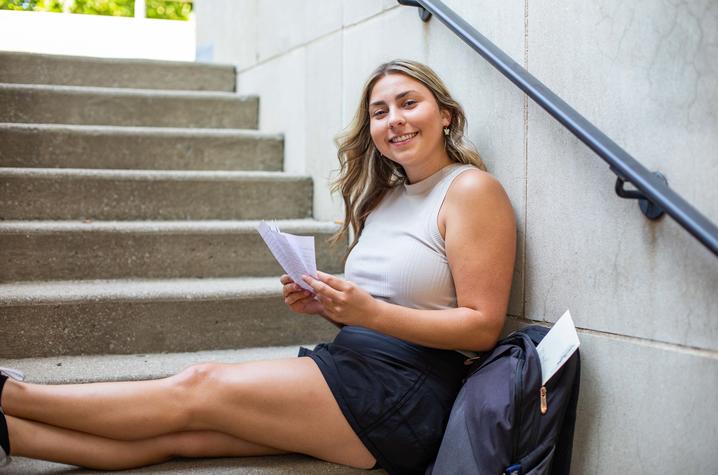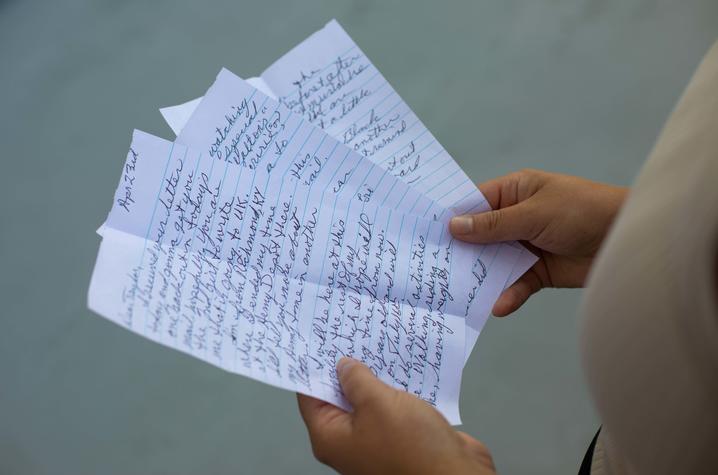The Art of Letter Writing: UK Health Sciences Students Reach Out to Patients
LEXINGTON, Ky. (Jan. 19, 2022) — Taylor Whetsell must have misheard.
Her professor asked her to do what?
“Write a letter.” Her professor asked everyone in class to do just that.
How? The last time Taylor, 21, wrote a letter was when she sent one to her French pen pal in fifth grade. Now, as a senior human health sciences major in the University of Kentucky College of Health Sciences, she was being asked by Professor Karen Skaff, Ph.D., to write to one of the residents in Lexington’s Homestead Post-Acute Care Center.
Each student would do the assignment. Why? Because normally — as in, when there isn’t a pandemic going on — the class would travel to the Acute Care Center for a visit. Sometimes they would even take a trip to New Orleans to give back in similar ways. But Skaff knew they wouldn’t be able to go due to COVID-19, so they decided to do the next best thing. They would write letters to brighten the patients’ days.
“I actually got really excited,” Taylor said. “I was ready to write. And I was really happy that Professor Skaff came up with a way for us to still help, even though we couldn’t physically travel to see them.”
So she went about the assignment. She introduced herself, described her life and where she was from (Illinois) and included some of her interests. Then the letters were mailed off, and she didn’t think much more about it.
Until she got a response.
‘It’s a powerful thing’
Annette Dence says those in the Homestead Post-Acute Care Center adored hearing from the college students.
Dence, the activities director and volunteer coordinator, said the 125 room-bound residents loved the student stories, photos and personal notes. Some of them would share their mail with the workers, and tell them about their new pen pals.
“I read the letters, too,” Dence said. “And I just thought it was great (the students) were able to still do something. The residents just love it so much. I mean, we’ve been locked down for 13 months where very few people were able to come in. This is just a treasure.”
Dence said it was also a nice distraction from the everyday toll of trying to keep everyone safe and happy during a trying time.
“Thirty years ago, people were writing letters all the time,” she said. “It’s a powerful thing. It’s a way to share a bit of yourself without having to come into the building. They made everything a bit more cheerful and happy.”
Skaff said the course itself focuses on community engagement and service learning.
“But while we were limited to online modalities, away from contact with people in our communities here in Lexington, serving the southeastern counties in rural Kentucky and even New Orleans, we still were able to reach out and touch,” she said. “In reading the students’ reflections at the end of the semester, I was surprised to learn that most of the 85 students stated that they highly valued this letter writing experience as a way to connect with people while they too felt isolated during the COVID restrictions.”
‘Something students will remember’
Claude wrote back. That was his name, Claude.
Taylor never expected a return letter. But she got one. And in it, she learned that Claude was from Richmond, that he had worked at an Army Depot and enjoyed walking and riding his bike.
They were small details. But sometimes, small details mean a lot.
“It was so interesting learning about his life,” Taylor said. “He seemed very happy, and that made me happy.”
For Skaff, a professor in Clinical Leadership and Management and Human Health Sciences, the whole assignment was another way to reach out and help the community, even when it seemed they would not be able to. Many times, the class gets just as much out of it as the residents, she said.
“A lot of them have never written a letter before,” she said. “But it’s more than that — it’s about making a connection, reaching out to another person in a time when it’s difficult to do so. It’s about modifying our lessons when we can and accommodating for both the changing educational climate and the changing needs of our students.”
It means that when you can’t go out on your normal trip to interact with residents, you write them a letter. And sometimes, you even hear back.
Skaff says there are some elements she’s incorporated into her face-to-face classes as well — unique, interactive elements such as podcasts, surveys and online discussions that make classes more accommodating, empathetic, interactive and engaging.
“I don’t want my classes to just be good. I want them to be substantive, something that students will remember,” she explained. “I’m learning just how hard we have to work. I’ve realized that we’ve got to be a lot more intentional about engaging students and engaging one another. I think that’s something I’ll be trying to do forever.”
As the state’s flagship, land-grant institution, the University of Kentucky exists to advance the Commonwealth. We do that by preparing the next generation of leaders — placing students at the heart of everything we do — and transforming the lives of Kentuckians through education, research and creative work, service and health care. We pride ourselves on being a catalyst for breakthroughs and a force for healing, a place where ingenuity unfolds. It's all made possible by our people — visionaries, disruptors and pioneers — who make up 200 academic programs, a $476.5 million research and development enterprise and a world-class medical center, all on one campus.






